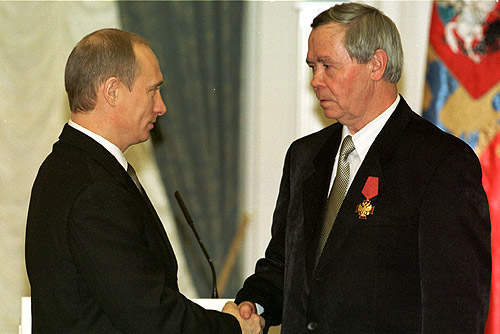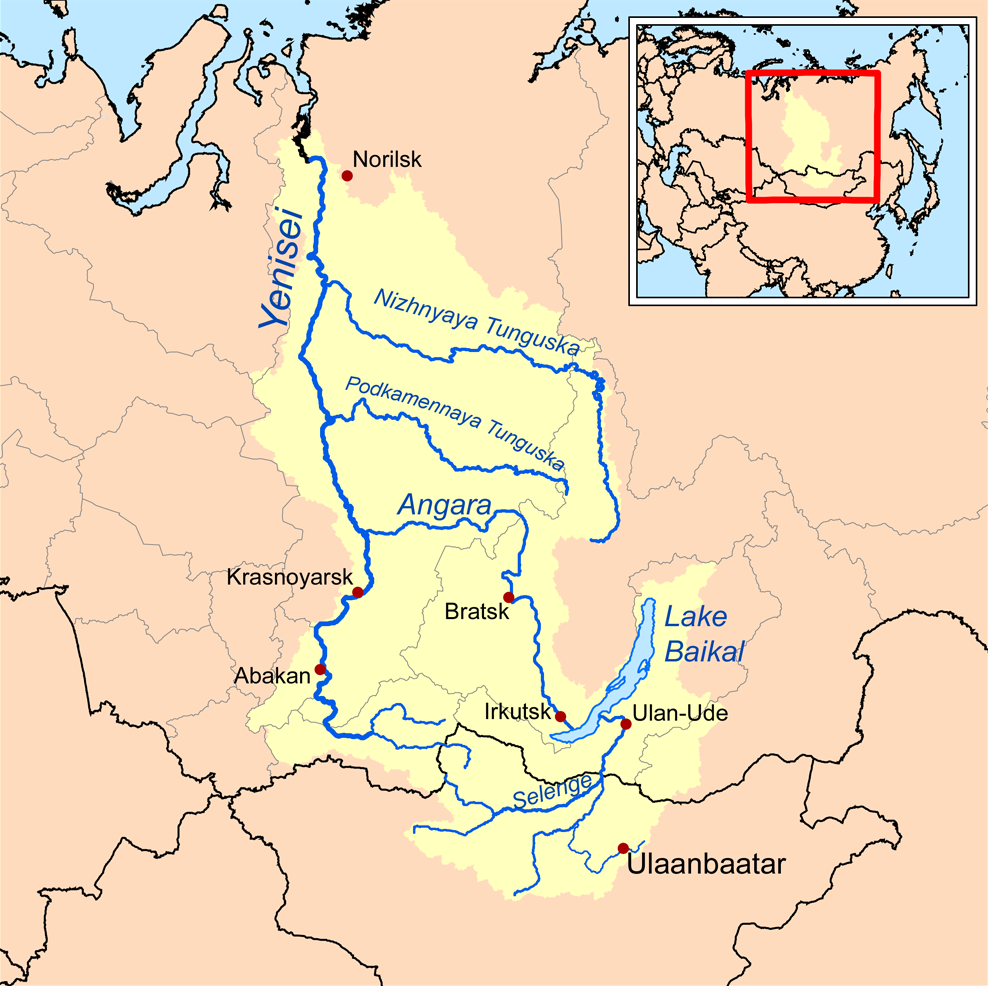|
Valentin Rasputin
Valentin Grigoriyevich Rasputin (; russian: Валентин Григорьевич Распутин; 15 March 193714 March 2015) was a Russian writer. He was born and lived much of his life in the Irkutsk Oblast in Eastern Siberia. Rasputin's works depict rootless urban characters and the fight for survival of centuries-old traditional rural ways of life, addressing complex questions of ethics and spiritual revival. Biography Valentin Rasputin was born on 15 March 1937 in the village of Ust-Uda in Irkutsk Oblast of Russia. His father, Grigory Rasputin, worked for a village cooperative store, and his mother was a nurse. Soon after his birth the Rasputin family moved to the village of in the same Ust-Uda district, where Rasputin spent his childhood. Both villages, then located on the banks of the Angara River, do not exist in their original locations any more, as the Bratsk Reservoir flooded much of the Angara Valley in the 1960s, and the villages were relocated to higher gr ... [...More Info...] [...Related Items...] OR: [Wikipedia] [Google] [Baidu] |
Ust-Udinsky District
Ust-Udinsky District (russian: Усть-Удинский райо́н) is an administrative district, one of the thirty-three in Irkutsk Oblast, Russia.Charter of Irkutsk Oblast Municipally, it is incorporated as Ust-Udinsky Municipal District.Law #73-oz The area of the district is . Its administrative center An administrative center is a seat of regional administration or local government, or a county town, or the place where the central administration of a commune A commune is an alternative term for an intentional community. Commune or comună or ... is the urban locality (a work settlement) of Ust-Uda.Law #49-OZ Population: 16,747 ( 2002 Census); The population of Ust-Uda accounts for 36.0% of the district's total population. References Notes Sources * * * {{Use mdy dates, date=February 2013 Districts of Irkutsk Oblast ... [...More Info...] [...Related Items...] OR: [Wikipedia] [Google] [Baidu] |
Irkutsk
Irkutsk ( ; rus, Иркутск, p=ɪrˈkutsk; Buryat language, Buryat and mn, Эрхүү, ''Erhüü'', ) is the largest city and administrative center of Irkutsk Oblast, Russia. With a population of 617,473 as of the 2010 Census, Irkutsk is the List of cities and towns in Russia by population, 25th-largest city in Russia by population, the fifth-largest in the Siberian Federal District, and one of the largest types of inhabited localities in Russia, cities in Siberia. Located in the south of the eponymous oblast, the city proper lies on the Angara River, a tributary of the Yenisei River, Yenisei, about 850 kilometres (530 mi) to the south-east of Krasnoyarsk and about 520 kilometres (320 mi) north of Ulaanbaatar. The Trans-Siberian Highway (Federal M53 and M55 Highways) and Trans-Siberian Railway connect Irkutsk to other regions in Russia and Mongolia. Many distinguished Russians were sent into exile in Irkutsk for their part in the Decembrist revolt of 1825, and t ... [...More Info...] [...Related Items...] OR: [Wikipedia] [Google] [Baidu] |
Northern River Reversal
The Northern river reversal or Siberian river reversal was an ambitious project to divert the flow of the Northern rivers in the Soviet Union, which "uselessly" drain into the Arctic Ocean, southwards towards the populated agricultural areas of Central Asia, which lack water. Research and planning work on the project started in the 1930s and was carried out on a large scale in the 1960s through the early 1980s. The controversial project was abandoned in 1986, primarily for environmental reasons, without much actual construction work ever done. Development of the river rerouting projects The project to turn Siberian rivers goes back to the 1830s, when tsarist surveyor Alexander Shrenk proposed it"Making Rivers Run Backward" Time U.S., Frederic Golden; By Frederic Golden, reported by: Erik Amfitheatr, Mon ... [...More Info...] [...Related Items...] OR: [Wikipedia] [Google] [Baidu] |
Lake Baikal
Lake Baikal (, russian: Oзеро Байкал, Ozero Baykal ); mn, Байгал нуур, Baigal nuur) is a rift lake in Russia. It is situated in southern Siberia, between the federal subjects of Irkutsk Oblast to the northwest and the Republic of Buryatia to the southeast. With of water, Lake Baikal is the world's largest freshwater lake by volume, containing 22–23% of the world's fresh surface water, more than all of the North American Great Lakes combined. It is also the world's deepest lake, with a maximum depth of , and the world's oldest lake, at 25–30 million years. At —slightly larger than Belgium—Lake Baikal is the world's seventh-largest lake by surface area. It is among the world's clearest lakes. Lake Baikal is home to thousands of species of plants and animals, many of them endemic to the region. It is also home to Buryat tribes, who raise goats, camels, cattle, sheep, and horses on the eastern side of the lake, where the mean temperature var ... [...More Info...] [...Related Items...] OR: [Wikipedia] [Google] [Baidu] |
Izvestiya
''Izvestia'' ( rus, Известия, p=ɪzˈvʲesʲtʲɪjə, "The News") is a daily broadsheet newspaper in Russia. Founded in 1917, it was a newspaper of record in the Soviet Union until the Soviet Union's dissolution in 1991, and describes itself now as a "national newspaper" of Russia. The word ''izvestiya'' in Russian means "bring news" or "tidings", "herald" (an official messenger bringing news), derived from the verb ''izveshchat'' ("to inform", "to notify"). Origin The newspaper began as the ''News of the Petrograd Soviet of Workers Deputies'' on in Petrograd. Initially, the paper expressed Menshevik and Socialist-Revolutionary Party views. In August 1917, it took the title ''News of the Central Executive Committee of the Petrograd Soviet of Workers' and Soldiers' Deputies''. By October 1917 it became ''News of the Central Executive Committee of the Soviets of Working and Military Deputies'', and was eventually re-titled ''News of the Soviets of People's Deputies''. ... [...More Info...] [...Related Items...] OR: [Wikipedia] [Google] [Baidu] |
Yelets
Yelets, or Elets (russian: Еле́ц), is a city in Lipetsk Oblast, Russia, situated on the Bystraya Sosna River, which is a tributary of the Don. Population: History Yelets is the oldest center of the Central Black Earth Region. It was mentioned in historical documents as early as 1146 or 1147, when it was a fort belonging to the Princes of Ryazan. The town's position at the very south of Russian lands made it an easy prey for Turkic conquerors. The Mongols burned it in 1239, Uzbeg Khan ravaged it in 1316, Timur sacked it in 1395, and the Tatars devastated it in 1414. In 1483, the Principality of Yelets was absorbed by the Grand Duchy of Moscow, while the local Rurikid rulers (last heard of in the 19th century) entered the service of Ivan III. In 1591, Boris Godunov revived the largely deserted town by establishing a fortress there. In 1618, the fortress was captured "by subterfuge" by 20,000 Cossacks under Petro Konashevych-Sahaidachny, allied with Władysław&n ... [...More Info...] [...Related Items...] OR: [Wikipedia] [Google] [Baidu] |
Russian Orthodox Church
, native_name_lang = ru , image = Moscow July 2011-7a.jpg , imagewidth = , alt = , caption = Cathedral of Christ the Saviour in Moscow, Russia , abbreviation = ROC , type = , main_classification = Eastern Orthodox , orientation = Russian Orthodoxy , scripture = Elizabeth Bible ( Church Slavonic) Synodal Bible (Russian) , theology = Eastern Orthodox theology , polity = Episcopal , governance = Holy Synod of the Russian Orthodox Church , structure = Communion , leader_title = , leader_name = , leader_title1 = Primate , leader_name1 = Patriarch Kirill of Moscow , leader_title2 = , leader_name2 = , leader_title3 = Bishops , leader_name3 = 382 (2019) , fellowships_type = Clergy , fellowships = 40,514 full-time clerics, including 35,677 presbyters and 4,837 de ... [...More Info...] [...Related Items...] OR: [Wikipedia] [Google] [Baidu] |
Baptism
Baptism (from grc-x-koine, βάπτισμα, váptisma) is a form of ritual purification—a characteristic of many religions throughout time and geography. In Christianity, it is a Christian sacrament of initiation and adoption, almost invariably with the use of water. It may be performed by sprinkling or pouring water on the head, or by immersing in water either partially or completely, traditionally three times, once for each person of the Trinity. The synoptic gospels recount that John the Baptist baptised Jesus. Baptism is considered a sacrament in most churches, and as an ordinance in others. Baptism according to the Trinitarian formula, which is done in most mainstream Christian denominations, is seen as being a basis for Christian ecumenism, the concept of unity amongst Christians. Baptism is also called christening, although some reserve the word "christening" for the baptism of infants. In certain Christian denominations, such as the Lutheran Churches, baptism ... [...More Info...] [...Related Items...] OR: [Wikipedia] [Google] [Baidu] |
Battle Of Kulikovo
The Battle of Kulikovo (russian: Мамаево побоище, Донское побоище, Куликовская битва, битва на Куликовом поле) was fought between the armies of the Golden Horde, under the command of Mamai, and various Russian principalities, under the united command of Prince Dmitry of Moscow. The battle took place on 8 September 1380, at the Kulikovo Field near the Don River (now Tula Oblast, Russia) and was won by Dmitry, who became known as russian: script=Latn, Donskoy, label=none, lit=of the Don after the battle. Although the victory did not end Mongol domination over Rus, it is widely regarded by Russian historians as the turning point at which Mongol influence began to wane and Moscow's power began to rise. The process eventually led to Grand Duchy of Moscow independence and the formation of the modern Russian state. Background After the Mongol-Tatar conquest, the territories of the disintegrating Kievan Rus became part ... [...More Info...] [...Related Items...] OR: [Wikipedia] [Google] [Baidu] |
Union Of Soviet Writers
The Union of Soviet Writers, USSR Union of Writers, or Soviet Union of Writers (russian: Союз писателей СССР, translit=Soyuz Sovetstikh Pisatelei) was a creative union of professional writers in the Soviet Union. It was founded in 1934 on the initiative of the Central Committee of the Communist Party (1932) after disbanding a number of other writers' organizations, including Proletkult and the Russian Association of Proletarian Writers. The aim of the Union was to achieve party and state control in the field of literature. For professional writers, membership of the Union became effectively obligatory, and non-members had much more limited opportunities for publication. The result was that exclusion from the Union meant a virtual ban on publication. However, the history of the Union of Writers also saw cases of voluntary self-exclusion from its cadre. Thus, Vasily Aksenov, Semyon Lipkin, and Inna Lisnyanskaya left the Union of Writers in a show of solidarity aft ... [...More Info...] [...Related Items...] OR: [Wikipedia] [Google] [Baidu] |






